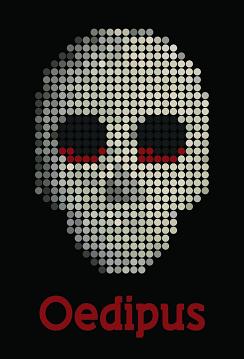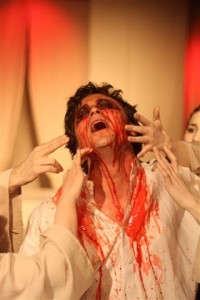
LOVELY STAGING, BUT PERFORMANCES LACK FINESSE
Since its premiere in c. 429 BC, Sophocles’ Oedipus the King has been considered the Mount Olympus of Greek Tragedies, largely because it humanizes the theme of fate, a subject that fascinated the Greek culture; personally, I warrant that a story which contains patricide, unholy incest, self-mutilation and not leaving well enough alone titillates spectators; these issues also serve as brilliant metaphors that summon up our own thoughts about predestination and free will.
A recent and extremely accessible translation by Jamey Hecht (published in 2005) is currently being mounted by the classical company The Porters of Hellsgate. While the staging by Thomas Bigley (aided by choreographer Taylor Fisher) is inventive and fluid, his actors, for the most part, have yet to create internal conflict and emotional subtext. Charles Pasternak, as Oedipus, does some fine work, especially the immature pomposity in Act One, but ultimately his overwrought interpretation after Oedipus blinds himself is his undoing; the agony and sadness feel forced. Even the sincerest performances lend themselves to classical caterwauling or stone-faced silence, magnified by the fact that the Sherry Theatre is such a tiny space. The cast has a clear command of the text, but nuances of humor and discovery basically lie dormant, as if motivation was never discussed – mere seriousness, however well-intentioned, can become tedious. What makes this Oedipus somewhat tolerable is the earnestness and dedication of the company, even as the players flounder for resonance. Without interpretation and development of character, OEDIPUS reads like a dull Biblical oration.
At last year’s production of Sophocles’ Elektra at The Getty, we saw Pamela Reed’s mischievous Clytemnestra – a combination of controlled conceit, fury and bitchiness which fueled her passive-aggressive condescension toward Elektra. Her commitment to a variety of bold choices served to explain how she could be so heartless. In Oedipus, there is no duplicity in Kate O’Toole’s Jocasta when she realizes that Oedipus is about to uncover the truth, that she who bore his children is really his mother. Miss O’Toole played panic and worry when a more interesting choice might have been to mask her realization. Giddy laughter for nervousness? False pride to hide shame? Without specificity of choice, the dialogue appears more scholarly than shocking.
To be heard and seen, the Greeks needed mask-wearing, highly presentational actors, but today’s audiences need subtlety and creation of character to bring life to this cautionary tale, rich as it is in magnificently philosophical musings. Still, there is a grace and beauty to the Chorus’ intermingling with the principle players; Mr. Bigley is to be commended for the visual elegance, aided by costumer Jessica Pasternak and lighting designer Alex Parker.
Oedipus the Tyrant
ends on March 13, 2011
for tickets, visit Porters of Hellsgate


